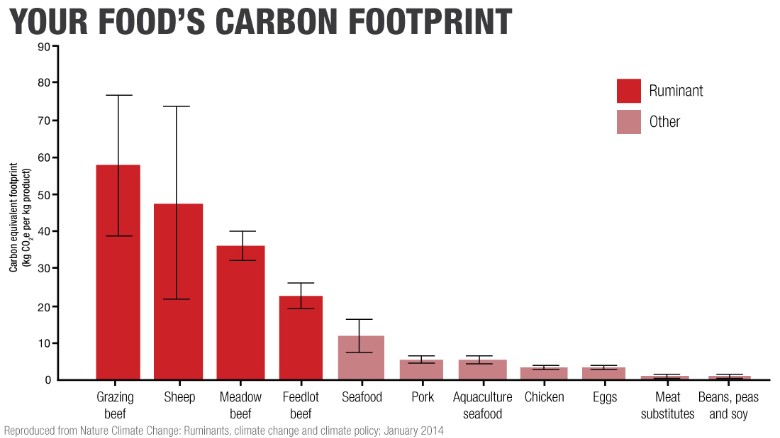Those of you who know me well know that I don’t serve beef at home and do my best to avoid it on the road. I don’t normally talk about why; most people assume it’s for religious reasons, because I also avoid pork. But it’s not for religious reasons, nor is it for health reasons. It’s for the environment.
Back in 1999 the Union of Concerned Scientists came out with a book entitled The Consumer’s Guide to Effective Environmental Choices. This was based on a report that was roughly entitled, “Paper or Plastic: Who Cares?” The number 1 thing that UCS said that one could do for the environment was to drive less and buy an efficient car. The number 2 thing one could do was to eat less meat, and most specifically beef. Well now CNN has an article about just this. Borrowing a graph:

In that article, the author calculates that eating 1.27 lb of beef has the same carbon footprint as a 70 mile drive in a car that gets 21 mpg. In other words, that number goes up with a more efficient vehicle. He argues that to help arrest the rate of global warming we need to eat less meat.
Even back in 1996, when the first UCS report came out, the one thing I could do for the environment was eat less beef. (I’ve since curtailed my driving, and Christine and I have reduced to 1 vehicle.) The bad news is that lamb is probably just about as bad (wah!) and I will probably reduce but not eliminate my lamb consumption.
The above graph only looks at carbon footprint, and probably not all of it. 1 lb of beef requires about 1,800 gallons of water. When I lived in California, this number seemed unsustainably large, even while we were being hit with El Niño after El Niño. In addition, cattle also cause grazing damage, although it may be possible to mitigate those effects.
Pigs are a different matter. I stopped eating pork products when several Colorado counties became awash in pig effluvia. It wasn’t scientific, but I figured I could do my part by simply reducing demand for the animal.
I’ve refrained from writing this sort of article. This was a personal choice I made, and I really didn’t push it on anyone. I’m doing so now – just this once – for my daughter, so that she and her generation have just a little less damage from our generation to repair.
Have you read Vaclav Smil’s ‘Should We Eat Meat’?
I ask as it came up in a Bill Gates book list http://uk.businessinsider.com/bill-gates-favorite-books-2015-10?r=US&IR=T that quotes this passage:
‘It turns out that not all water is created equal. Nearly 90 percent of the water needed for livestock production is what’s called green water, used to grow grass and such. In most places, all but a tiny fraction of green water comes from rain, and because most green water eventually evaporates back into the atmosphere, it’s not really consumed.’
It’s good to see you blogging again 🙂
Thanks, Chris. Glad you’re reading it! I’ve not read the book. While I do believe in conservation of matter, there have been droughts throughout the west over the last five years, and I would be skeptical that the evaporated water is returning to the same environment in short periods of time. But it looks like a good read.
What’s interesting is that while beef prices are highly volatile, over the last five years the trend has been largely stable. One has to go ten years back to find serious price movement. Here’s an interesting price comparison:
http://www.indexmundi.com/commodities/?commodity=beef&months=120&commodity=chicken